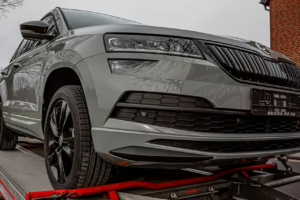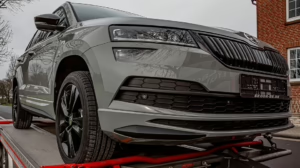Toyota’s Bold Leap into Electric Vehicles: What’s Next for the Automotive Giant?
In recent years, the automotive landscape has experienced seismic shifts, with electric vehicles (EVs) emerging as a dominant force in the market. Pioneers like Tesla have visibly transformed consumer expectations and industry standards, compelling traditional automakers to pivot their strategies. Among these automakers, Toyota, once a flagbearer of hybrid technology, is making a bold leap into the world of fully electric vehicles. As the company unveils its electrification roadmap, questions linger: What prompted this change, and what can we expect next from the automotive giant?
Toyota’s EV Evolution
For decades, Toyota has established itself as a leader in hybrid technology with the groundbreaking Prius. This commitment to hybrid systems allowed the brand to navigate the shift towards eco-friendly driving while still relying predominantly on internal combustion engines (ICE). However, as global regulations tighten and consumer demand for zero-emissions vehicles surges, Toyota has initiated a comprehensive strategy to embrace full electrification.
In 2021, Toyota announced its intention to invest over $35 billion in battery technology and electric vehicle development by 2030. The automaker plans to introduce 30 electric models and aims to produce around 3.5 million EVs annually by that same year. This ambitious goal marks a significant departure from its earlier hesitance to fully commit to battery electric vehicles (BEVs).
The Acceleration of Strategy
Toyota’s recent strategies reveal a multifaceted approach to the EV market. First, the company aims to leverage its expertise in hybrid technology as a bridge to full battery electric vehicles. The introduction of the bZ (beyond Zero) series exemplifies this, with the bZ4X being Toyota’s first dedicated BEV offering globally. This model combines Toyota’s legacy of reliability and innovation, boasting advanced safety features and sustainable manufacturing practices.
Additionally, the company is focused on developing solid-state battery technology, which promises greater energy density, faster charging times, and reduced costs. By prioritizing this promising technology, Toyota aims to redefine the capabilities of EVs, overcoming one of the major barriers to EV adoption: range anxiety.
The Broader Market Context
The global automotive market is evolving rapidly. As Europe, the U.S., and parts of Asia ramp up their commitments to carbon neutrality and emissions reduction, consumers are being incentivized to switch to electric vehicles. Rival companies, from Ford to Volkswagen, have laid out aggressive electrification plans. Toyota’s entry into this arena is particularly crucial, given its historical dominance in the automotive market.
However, competition is fierce. Tesla continues to set benchmarks in innovation and market performance, while emerging players and established manufacturers alike are aggressively expanding their EV portfolios. Toyota’s challenge will be not just to catch up but to carve a unique identity within a crowded space.
Sustainability and Innovation
Beyond electrification, Toyota is keenly aware of the challenges of sustainability. The company is not only investing in batteries but also in hydrogen fuel cell technology, showcasing its commitment to multi-faceted solutions for environmentally-friendly transportation. This dual approach ensures that Toyota remains relevant, irrespective of which technology becomes predominant in the future.
Moreover, Toyota is exploring ways to build sustainable supply chains for battery production. This includes a focus on sourcing raw materials sustainably and investing in recycling technologies, minimizing the environmental impact associated with battery manufacturing and disposal.
What’s Next for Toyota?
As Toyota embarks on this electrification journey, several factors will shape its success. Market reception, technological advancements, and regulatory environments will all play critical roles. The company must also address consumer concerns around charging infrastructure and vehicle range, critical factors for widespread adoption.
Looking ahead, we can expect Toyota to maintain its commitment to innovation while ensuring that its vehicles meet the changing needs and preferences of consumers. By leveraging its extensive research and development capabilities, commitment to quality, and strong brand loyalty, Toyota aims to lead the charge in the electric vehicle revolution.
In conclusion, Toyota’s bold leap into electric vehicles symbolizes a pivotal moment for the automotive giant. As the market continues to evolve, the company’s strategic investments and innovative approaches to electrification will not only affect its own future but also shape the broader trajectory of the global automotive industry. With eyes on an electrified future, Toyota is poised to solidify its place as a key player in the next chapter of transportation.
[This article references aspects of Toyota’s strategy in the electric vehicle market which can be further explored through automotive industry resources and reports for data-backed insights.]


























Add Comment